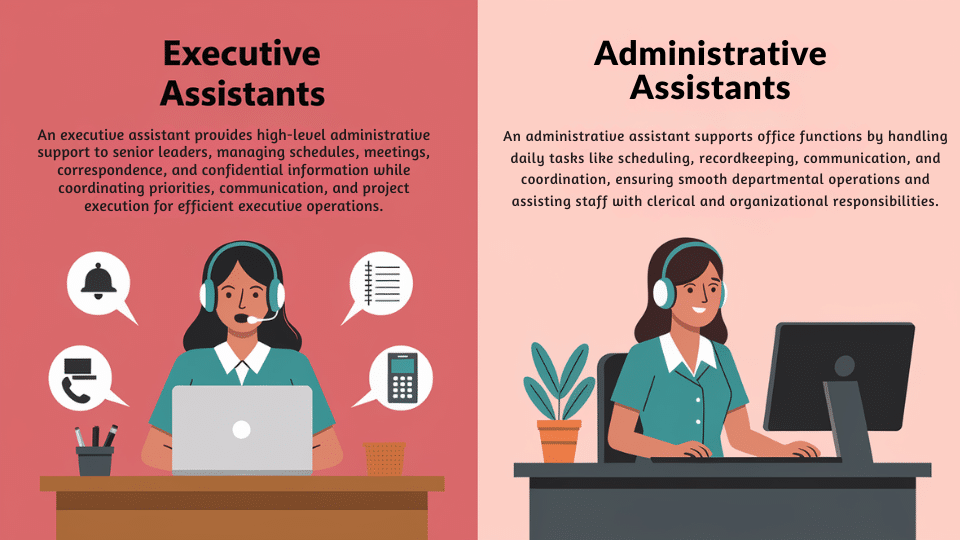Do you get confused between these two roles: executive assistant vs administrative assistant?
It’s easy to mix up, especially since both play a vital role in office success.
Many organizations use these titles interchangeably, but the truth is that their responsibilities, decision-making authority, and scope are quite different.
Both roles support business operations, yet one focuses on structure while the other focuses on strategy.
Finding the differences between these two positions helps employers build efficient teams and professionals choose the right career direction.
In this blog, I’ll explain how their duties, pay, and career paths differ, so you can decide which position aligns best with your business needs or goals.
Who is an Administrative Assistant?
An administrative assistant is a professional who keeps an office running smoothly.
They handle day-to-day tasks such as scheduling meetings, managing correspondence, organizing files, and supporting one or more teams.
Their main goal is to make sure operations stay organized, deadlines are met, and communication within the office flows efficiently.
According to the IAAP, administrative professionals
“perform a variety of administrative and clerical duties necessary to run an organization efficiently.”
Their work often includes
“managing information, preparing documents, scheduling appointments, and supporting supervisors, managers, and executives to ensure business processes operate effectively.”
Who is an Executive Assistant?
An executive assistant works directly with top-level executives like CEOs, CFOs, or senior leaders.
They coordinate complex schedules, organize meetings, manage travel, prepare key reports, and often act as a trusted partner who helps the executive focus on priorities.
In many companies, the executive assistant plays a strategic role by handling high-level communication and decision-support tasks.
The ASAP describes an executive assistant as
“a professional who provides advanced administrative support to executives, business leaders, or departments by managing projects, preparing high-level materials, and exercising independent judgment.”
Their reports and training resources also highlight that executive assistants
“serve as strategic partners to leadership, combining administrative expertise with decision-making and communication skills to drive organizational efficiency.”
Skills Required for an Administrative Assistant

1. Organization and Time Management
Administrative assistants must manage multiple priorities each day.
They organize schedules, maintain filing systems, and ensure meetings, tasks, and deadlines stay on track.
An effective organization keeps the office running smoothly.
2. Communication Skills
Clear communication is crucial for handling calls, emails, and written correspondence.
Administrative assistants often act as the first point of contact for clients or employees, so professional and polite communication strengthens company representation.
3. Attention to Detail
Accuracy in data entry, document preparation, and scheduling prevents costly mistakes.
Administrative assistants handle many repetitive yet important tasks that demand precision and consistency.
4. Technical Proficiency
Familiarity with office tools such as Microsoft Office Suite, Google Workspace, and scheduling or data management software is essential.
Basic knowledge of spreadsheets, document formatting, and email management improves productivity.
5. Multitasking and Prioritization
Administrative assistants often support several departments or team members at once.
Being able to juggle responsibilities while maintaining accuracy and efficiency is key to success.
6. Customer Service and Interpersonal Skills
Administrative assistants interact with employees, clients, and vendors daily.
Being approachable, professional, and helpful ensures smooth communication and strong workplace relationships.
7. Problem-Solving
Issues such as scheduling conflicts, supply shortages, or communication delays require quick thinking.
Administrative assistants should be able to identify small problems and resolve them before they disrupt workflow.
Executive Assistant Skills
1. Strategic Planning and Prioritization
Executive assistants manage complex schedules and competing priorities for senior executives.
They must understand organizational goals and plan daily activities to align with leadership objectives.
2. Decision-Making and Judgment
Executives rely on their assistants to make informed decisions, often without direct supervision.
This includes evaluating requests, filtering information, and determining what requires the executive’s attention.
3. Confidentiality and Discretion
Executive assistants handle sensitive documents, financial information, and strategic discussions.
Trustworthiness and discretion are critical to maintaining confidentiality and professional integrity.
4. Leadership and Coordination
Executive assistants often lead coordination across teams, manage other administrative staff, or guide projects on behalf of leadership.
This requires confidence, accountability, and strong leadership qualities.
5. Communication and Relationship Management
They act as the link between executives, staff, and external partners.
Strong written and verbal communication ensures that messages are clear, accurate, and professional.
6. Advanced Technical and Analytical Skills
Executive assistants use advanced tools such as CRM platforms, project tracking systems, and data analytics dashboards.
These tools allow them to produce reports, manage projects, and support decision-making.
Administrative assistants excel in managing daily office operations, while executive assistants apply advanced coordination and decision-making to support senior leadership.
Executive Assistant vs Administrative Assistant: Choosing the Right Role
1. Executive Assistant vs Administrative Assistant Salary
Executive Assistant:
Executive assistants usually earn higher salaries because they handle complex, confidential, and executive-level work.
In the U.S., the average pay ranges from $65,000 to $100,000+ annually, depending on company size, experience, and industry.
Senior executive assistants supporting C-suite leaders may also receive performance bonuses or benefits like stock options, travel perks, and flexible schedules.
Administrative Assistant:
Administrative assistants earn between $40,000 and $60,000 per year on average in the U.S.
Their pay depends on experience, industry, and location.
They typically receive standard benefits, such as health insurance, paid time off, and retirement contributions.
2. Roles and Responsibilities
Executive Assistant:
- Coordinates executive calendars and travel
- Prepares reports, presentations, and meeting briefs
- Handles confidential information
- Communicates with clients, board members, and partners
- Anticipates executive needs and priorities
Administrative Assistant
- Manages office communication and correspondence
- Schedules meetings and maintains department calendars
- Organizes files, data, and records
- Orders supplies and assists with office logistics
- Supports multiple staff members and teams
3. Whom Do They Report To?
Executive Assistant:
Reports directly to senior leaders or C-suite executives such as the CEO, COO, or CFO.
They often act as a representative or gatekeeper, filtering information before it reaches the executive.
Administrative Assistant
Usually reports to an office manager, department head, or team supervisor.
Their focus is broader, providing support to several staff members or departments.
4. Future Career Growth Opportunities
Executive Assistant:
Can advance into senior-level roles such as Senior Executive Assistant, Chief of Staff, or Operations Manager.
Their experience in leadership support and project management often opens doors to operations and strategy positions.
Administrative Assistant:
May grow into positions such as Office Manager, Executive Assistant, or Project Coordinator.
Gaining additional experience, certifications, and exposure to leadership tasks helps them move up the career ladder.
5. Education Requirements
Executive Assistant:
Usually requires a bachelor’s degree in business administration, communication, or a related field.
This level of education prepares them for handling analytical, confidential, and management-related responsibilities.
Administrative Assistant:
Commonly requires a high school diploma or an associate’s degree.
Experience in office software, communication, and coordination skills is often valued more than formal education for entry-level positions.
7. Work Experience
Executive Assistant:
Typically requires 3–7 years of administrative experience, often with direct exposure to executive or senior management support.
Many EAs have prior experience as administrative or office assistants before advancing.
Administrative Assistant:
Entry-level candidates are often accepted. Experience in customer service, clerical work, or general office administration strengthens eligibility for this position.
8. Education and Certification
Executive Assistant:
PACE Certification (Professional Administrative Certification of Excellence) by ASAP
CAP Certification(Certified Administrative Professional) by IAAP
Training in project management, business communication, or leadership
Administrative Assistant:
Office software courses (Microsoft Office Specialist, Google Workspace Certification)
Associate degree in business administration or office management
Optional PACE or CAP certifications for career growth
Executive Assistant vs Administrative Assistant vs Personal Assistant
| Category | Executive Assistant (EA) | Administrative Assistant (AA) | Personal Assistant (PA) |
|---|---|---|---|
| Main Focus | Supports senior executives with strategic and confidential tasks. | Handles daily office operations and team coordination. | Manages personal and professional tasks for an individual. |
| Primary Duties | Calendar control, reports, meeting prep, project management. | Scheduling, filing, communication, and data entry. | Travel, errands, event planning, correspondence. |
| Reports To | CEO or senior leadership. | Office manager or department head. | Individual employer or family. |
| Decision-Making | Highly independent and judgment-based. | Moderate – follows procedures. | Moderate – personal discretion. |
| Experience Level | 3–7 years of executive or admin experience. | Entry to mid-level; 1–3 years of experience. | 2–5 years in personal or executive support. |
| Average U.S. Salary | $65,000–$100,000+ | $40,000–$60,000 | $45,000–$80,000 |
| Career Path | Senior EA → Chief of Staff. | Office Manager → EA. | Executive Assistant → Household Manager. |
Similarities Between Executive Assistant and Administrative Assistant
While executive and administrative assistants work at different levels, they share many core responsibilities and skills that make both roles essential for smooth business operations.
1. Support for Business Efficiency
Both roles exist to increase productivity and reduce organizational bottlenecks.
They keep schedules organized, manage communication, and help their teams or executives stay focused on key objectives.
2. Communication and Scheduling
Executive and administrative assistants both coordinate calendars, book meetings, and handle daily correspondence.
Their attention to timing and organization ensures that company operations run without delays or overlap.
3. Client and Team Interaction
Both positions represent the company in professional settings.
They greet clients, coordinate with internal departments, and maintain relationships that contribute to the overall business reputation.
4. Use of Office Technology
Both rely on tools like Microsoft 365, Google Workspace, and project management platforms such as Asana or Trello.
Their ability to use technology effectively keeps workflows organized and information accessible.
5. Essential Soft Skills
Strong communication, problem-solving, multitasking, and adaptability are vital for both positions.
These soft skills help them manage competing demands, support teams, and maintain a professional work environment.
6. Cross-Industry Presence
Both roles are found in nearly every industry, from corporate offices and healthcare to education and finance.
Their flexibility and transferable skills make them valuable assets in any organizational setting.
7. Team Contribution
Administrative and executive assistants help teams function smoothly by organizing tasks, tracking deadlines, and supporting collaboration across departments.
8. Career Development Opportunities
Both roles offer room to grow. Administrative assistants often move into executive assistant roles, while executive assistants can progress into senior administrative, operations, or management positions.
Related reads: Library Assistant: Cover Letter Samples and Tips
Conclusion
Understanding the differences between executive and administrative assistants helps professionals choose the right career path and organizations build effective support teams.
Each role plays a critical part in keeping businesses running smoothly, with unique skills and responsibilities that contribute to overall success.
Are you considering a career in administrative support or what?
Think about your strengths, career goals, and the type of work that excites you.
Share your thoughts in the comments below, and check out these professional development courses to enhance your skills in these rewarding career fields.
Let me know in the comments below, which role are you going to choose for your better future?










